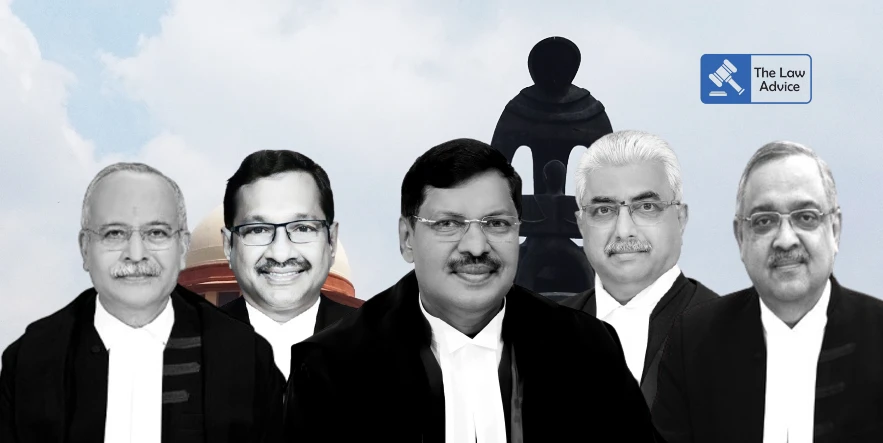In a landmark ruling, the Supreme Court Constitution Bench has clarified that a judicial officer who has completed seven years in the Bar is eligible for direct appointment as a District Judge.
Significantly, the Court further held that even persons in judicial service such as Civil Judges can be considered eligible for direct recruitment as District Judges if they have a combined experience of seven years as an advocate and judicial officer.
To maintain parity between advocates and in-service officers, the Court ruled that the minimum age for in-service candidates applying for direct recruitment as District Judges must be 35 years.
The bench directed state governments to amend and frame rules accordingly ensuring that in-service judicial officers with a total experience (Bar + Bench) of seven years are recognized as eligible for such recruitment.
However, the Court made it clear that this decision will apply prospectively, meaning it will not affect any recruitment processes already underway or completed.
The Bench and Judgments:
The five-judge Constitution Bench comprised Chief Justice of India BR Gavai, and Justices MM Sundresh, Aravind Kumar, SC Sharma, and K Vinod Chandran.
There were two concurring opinions one authored by CJI Gavai and another by Justice Aravind Kumar.
The Court emphasized that Article 233 of the Constitution, which governs appointments of District Judges, must be read holistically — its sub-articles cannot be treated in isolation.
Adopting a “purposive interpretation”, the Court observed that the provision should be understood in a way that enhances the efficiency of judicial administration and attracts competent candidates, rather than taking a narrow or literal approach.
Issues Before the Court:
The Constitution Bench examined four pivotal questions:
1. Whether a judicial officer with seven years of Bar practice can be considered for Bar quota vacancies in the District Judiciary.
2. Whether eligibility for appointment as a District Judge is determined at the time of application, appointment, or both.
3. Whether Article 233(2) prescribes any specific eligibility criteria for in-service judicial officers.
4. Whether a person who has been a Civil Judge for seven years or has a combined experience of seven or more years as Advocate and Civil Judge is eligible for appointment as a District Judge.
The case arose because the petitioners urged the Court to reconsider its earlier ruling in Dheeraj Mor v. High Court of Delhi (2020), where a three-judge bench had held that civil judges cannot apply for direct recruitment as District Judges under the Bar quota.
In the present matter, petitioners argued that the phrase “a person not already in the service of the Union or the State” in Article 233(2) should not be interpreted rigidly to exclude judicial officers. They asserted that the seven-year practice requirement does not necessarily mean seven continuous years of active advocacy.
Senior Advocates Jayant Bhushan, Arvind Datar, PS Patwalia, Gopal Sankarnarayanan, V Giri, Vibha Makhija, Jaideep Gupta, Seshadri Naidu, Manish Singhvi, and Menaka Guruswamy appeared for the petitioners.
The respondents, represented by Senior Advocates CU Singh, Nidhesh Gupta, Vijay Hansaria, and Rajiv Shakdher, defended the traditional interpretation that Article 233(2) applies only to practising advocates, as this interpretation had been consistently followed for over six decades, thereby attracting the principle of stare decisis. They also maintained that seven years of continuous Bar practice is mandatory.
Why the Matter Was Referred to a Larger Bench:
The reference arose from a Kerala High Court case involving Rejanish K.V., whose appointment as District Judge was set aside on the ground that he was not a practising advocate at the time of appointment but was serving as a Munsiff-Magistrate.
Rejanish, who had already completed seven years of practice at the Bar when he applied, was appointed as Munsiff while the District Judge selection process was still pending. Later, after being selected as District Judge, he resigned from his lower judicial post to take up the higher appointment.
However, the Kerala High Court relied on Dheeraj Mor to hold him ineligible, declaring that an applicant must remain a practising advocate until appointment.
Recognizing that this interpretation could impact numerous appointments nationwide, the Division Bench of the High Court granted a certificate to appeal to the Supreme Court, observing that the issue raised a substantial question of constitutional law.
The Supreme Court stayed the High Court’s order in 2021, and the case eventually evolved into this Constitution Bench reference titled:
Rejanish K.V. v. K. Deepa [Civil Appeal No. 3947/2020].
This ruling marks a major shift in the eligibility framework for District Judges in India.
It acknowledges experience accumulated on both sides of the Bench — allowing advocates who have joined judicial service to still leverage their Bar experience for higher judicial recruitment.
By adopting a progressive and inclusive interpretation of Article 233, the Court has broadened the pathway for judicial talent, ensuring a level playing field between practising lawyers and serving judges.
